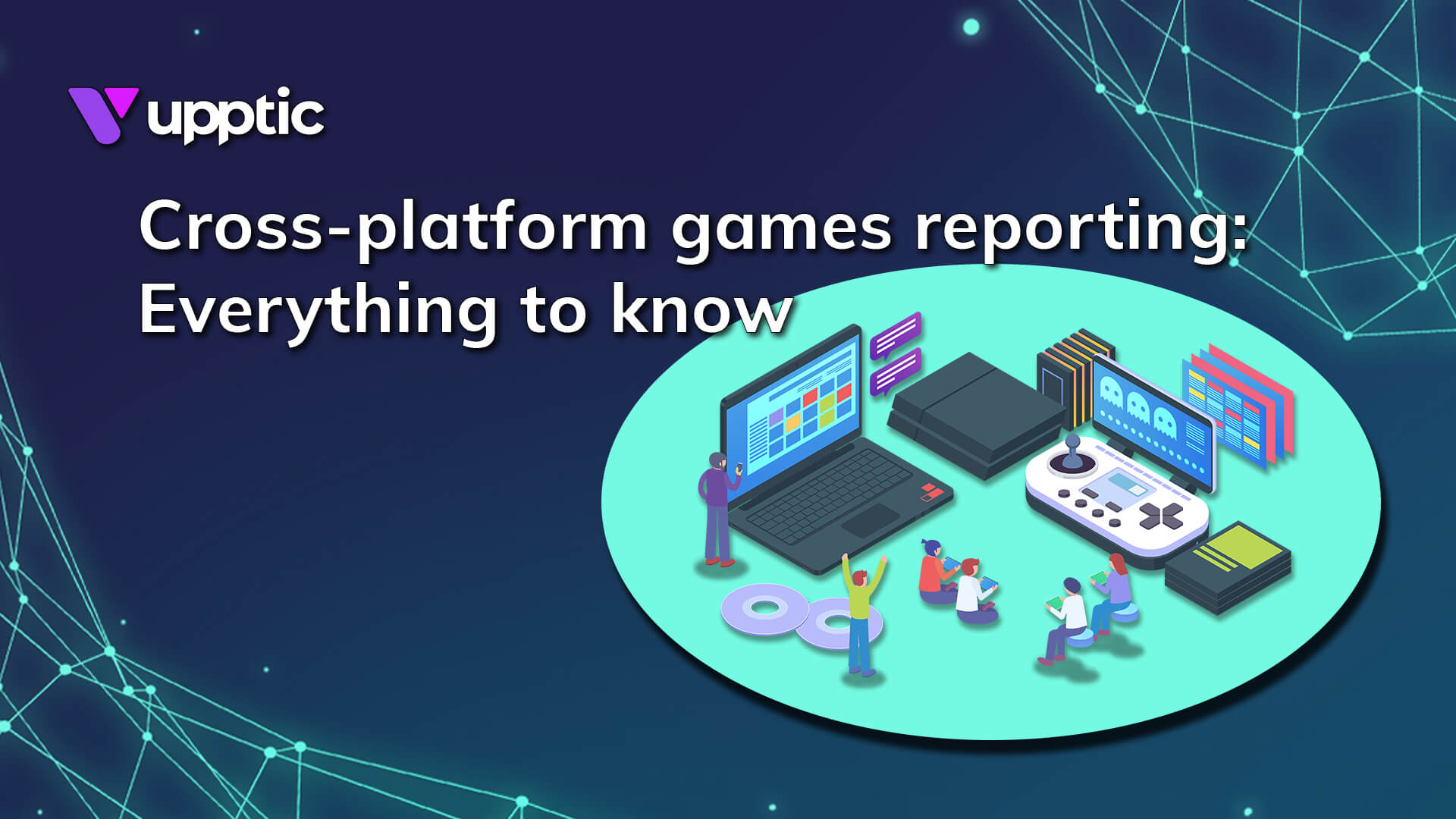Cross-platform games reporting is the process of tracking and analyzing gameplay data across various gaming platforms, including consoles (Xbox, PlayStation, Nintendo), PCs, and mobile devices (Google Android and Apple iOS). It involves gathering information on player behavior, performance, and preferences, allowing developers and publishers to gain valuable insights into the gaming experience across different platforms.
By monitoring and evaluating data from cross-platform games, developers can optimize their games for a seamless experience across devices and cater to the diverse needs of the PC games, console games, and mobile games their players play.
Let’s dive into this ascendant sector of the gaming industry!
- The importance of cross-platform games
- The need for cross-platform games reporting
- Challenges in cross-platform games reporting
- Key metrics and analytics in cross-platform games reporting
- Partners and tools for cross-platform games reporting
- Best practices for effective cross-platform games reporting
- Future trends in cross-platform games reporting
- Key takeaways
The importance of cross-platform games
Cross-platform games have become increasingly important in recent years. They have revolutionized how games are played and experienced, breaking down the barriers that once limited players to specific platforms.
No longer are gamers limited to only one platform. Cross-platform games enable gamers to connect and play together, regardless of the device they use – which more and more players prefer. This enhanced accessibility not only fosters a more inclusive gaming community but also allows for epic games with many players and more dynamic multiplayer experiences.
The need for cross-platform games reporting
With the rise of cross-platform games, accurate and timely reporting has become crucial for developers and publishers. It enables them to understand player behavior and preferences across different platforms, identify areas for improvement, and make informed decisions to enhance gameplay and optimize their games.
Better reporting can lead to a better matchmaking experience in multiplayer games, a better and more accessible cross-play game experience for players across supported platforms, and an expanded player base for game developers.
The growing need for cross-platform games and accurate associated reporting is driven by the desire to create new and improved cross-platform play and multiplayer experiences for players, gain a competitive edge in the market, boost sales and maximize revenue for game developers.
Challenges in cross-platform games reporting
Cross-platform games face several unique challenges when it comes to accurate reporting – from diverse software and hardware ecosystems to privacy concerns. Luckily, there are solutions that the games industry can build toward together.
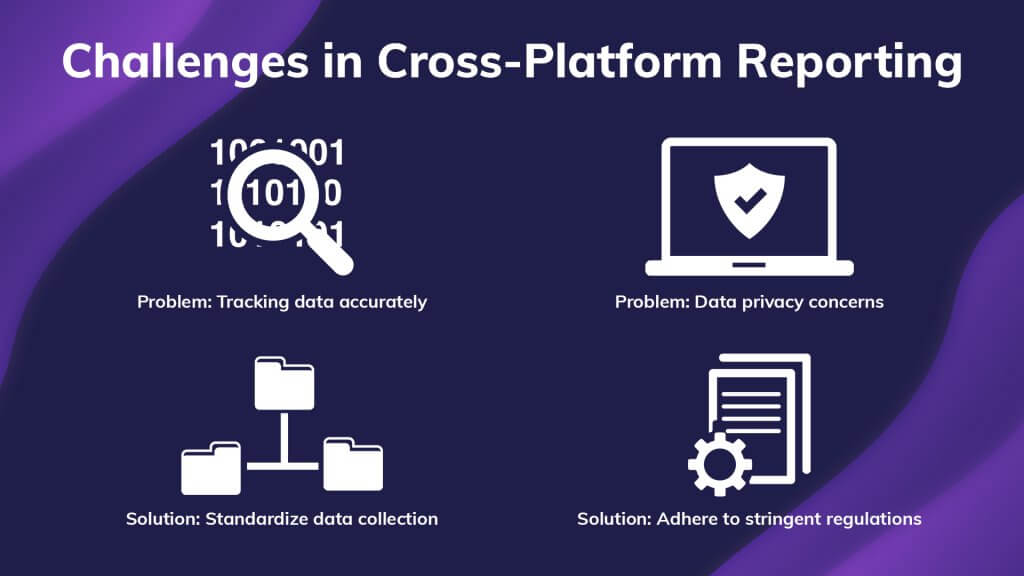
Tracking data accurately and consistently
Tracking gameplay across multiple platforms poses significant technical complexities for cross-platform games reporting. Each gaming platform has its unique set of technologies, APIs, and data formats, making it challenging to collect and consolidate data uniformly.
Developers face the task of implementing robust tracking mechanisms that can accurately capture gameplay data across different platforms and ensure data integrity. Moreover, the diverse hardware configurations and software environments further complicate the tracking process, requiring developers to develop sophisticated tracking solutions to overcome compatibility issues and ensure consistent data collection.
Solution: Standardize data collection and reporting
Standardization of data collection and reporting methods is essential for effective cross-platform games reporting. Such standardization facilitates seamless integration and analysis of data from various platforms, enabling developers and publishers to derive meaningful insights.
Establishing industry-wide standards for data collection and reporting ensures consistency, comparability, and compatibility of the reported data, allowing for accurate cross-platform analytics and benchmarking.
Data privacy concerns
Privacy and security concerns surrounding user data are important considerations in cross-platform games reporting. As gameplay data is collected across different platforms, protecting user privacy becomes paramount.
Solution: Adhere to stringent privacy regulations
Developers and publishers must adhere to stringent data privacy regulations and implement robust security measures to safeguard user account information. Anonymization and encryption techniques can help protect user identities and sensitive data, ensuring that the reported data is both accurate and secure.
By prioritizing privacy and security in cross-platform games reporting, the industry can build trust and support among players and stakeholders, fostering a responsible and reliable gaming ecosystem.
Key metrics and analytics in cross-platform games reporting
Key metrics and analytics in cross-platform games reporting provide invaluable insights into player behavior, performance, and preferences, enabling developers and publishers to optimize their cross-play games and enhance the gaming experience.
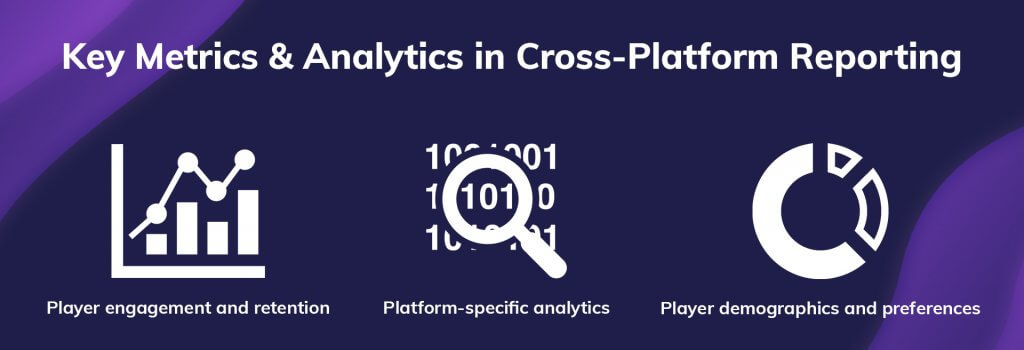
Player engagement and retention
One essential metric is player engagement and retention rates. By tracking how long players stay engaged with a game and the frequency of their return visits, developers can gauge the game’s appeal and identify opportunities for improvement.
Understanding player engagement and retention helps developers optimize gameplay elements, introduce new features, and create targeted marketing strategies to enhance player loyalty and extend the lifespan of those playing their games.
Platform-specific analytics
Another critical aspect of cross-platform games reporting is analyzing platform-specific performance and user behavior. This involves tracking metrics such as gameplay performance, load times, and crash rates across different platforms.
By comparing performance metrics, developers can identify platform-specific issues and optimize their games to deliver a consistent and smooth experience across all platforms. Furthermore, analyzing user behavior, such as playtime patterns and interactions, helps identify trends and preferences unique to each platform.
This insight can inform decision-making regarding platform-specific updates, content delivery, and monetization strategies, tailored to the preferences and behaviors of players on each platform.
Player demographics and preferences
In addition to platform-specific metrics, comparative analysis of player demographics and preferences is crucial in cross-platform games reporting. By examining player demographics, such as age, gender, location, and interests, developers can better understand their target audience across platforms. Comparative analysis also allows for identifying demographic variations in player preferences, game modes, and purchasing behavior.
Armed with this information, developers can customize marketing campaigns, optimize in-game monetization strategies, and create targeted content updates to cater to the specific preferences of different player segments across platforms, enhancing player satisfaction and driving revenue growth.
Partners and tools for cross-platform games reporting
When it comes to cross-platform games reporting, utilizing the right tools and technologies is crucial for accurate and efficient data tracking and analysis.
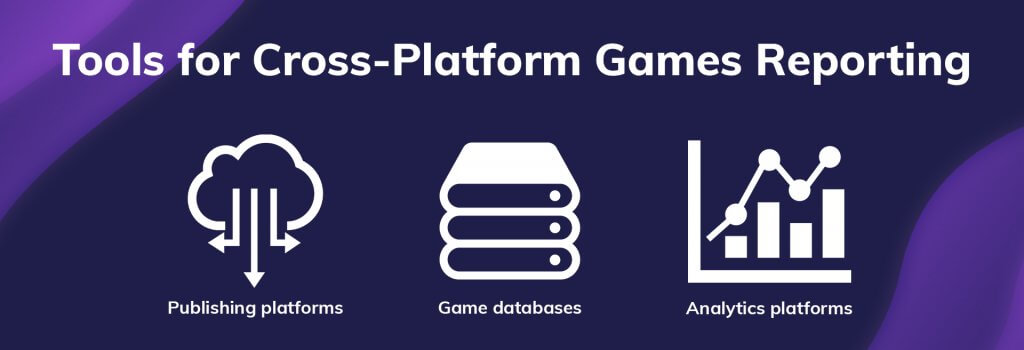
Publishing and distribution platforms
There are multiple platforms for launching and distributing games across platforms. The data gathered from distribution and publishing platforms are foundational for understanding your game’s performance. Here are some of the most popular publishing and distribution platforms that must be aggregated to understand cross-platform performance.
Android & Apple
On mobile, The Google Play Store for Android and Apple App Store for iOS are the most popular avenues for mobile game distribution. These stores make up more than 95% of the mobile gaming market. They both have their own sets of rules and regulations as well – so make sure to do your research before building a game for either.
Steam & Epic
Featuring over 50,000 games, Steam is the most well known platform for PC gaming digital distribution – though it also hosts some mobile games as well. The Epic Games Store is much smaller – but is well known for its exclusives and promos.
PlayStation, Nintendo, Xbox
For consoles, there’s only three real options: PlayStation by Sony, Nintendo by (you guessed it) Nintendo, or Xbox by Microsoft. Each of their associated stores features thousands of games and many platform exclusives as well. Be aware that some platforms my also have fees associated with cross-platform games – so be sure to do your due diligence beforehand!
Game databases and first-party data
Nearly all games have some sort of first-party game database that includes information about your game, and players. First-party databases are key for effective cross-platform games reporting. First-party data helps you understand your players. And in cross-platform games reporting, it helps ensure that you’re not counting players again and again as they move across platforms.
First-party data can make ad targeting, audience suppression, and lookalike modeling more feasible and accurate. With increasingly stringent privacy rules from app stores and regulations from governments, first-party data is becoming increasingly important for both acquisition and retention.
Attribution and Analytics platforms
These platforms offer robust tracking and reporting capabilities specifically tailored for the gaming industry. They provide developers and publishers with comprehensive analytics dashboards, real-time data visualization, and advanced reporting features.
By integrating these analytics platforms, game companies can gather valuable insights into player behavior, engagement, and monetization across multiple platforms, helping them make informed decisions to optimize their games and enhance the player experience.
Gamesight
Gamesight is a leading PC game attribution platform. However, they also have cross-platform insights – providing real-time data and analytics, advanced audience segmentation, and engagement features. They also offer fraud prevention tools and integration with popular ad networks and marketing platforms.
AppsFlyer
AppsFlyer is a leading mobile attribution platform. However, they can also connect to gaming platforms such as Windows PC and Steam through SDK and API integrations. Their platform provides attribution, analytics, and fraud prevention tools, as well as advanced audience segmentation and engagement features.
Adjust
Adjust is one of the leading MMPs (mobile measurement partners) in the space. Their platform features built-in automation, actionable analytics, and unlimited data access. Adjust offers cross-device tracking through their web and mobile SDKs.
MASA
MASA offers game reporting and analytics for PC, Android, iOS, and more on their Games Growth Platform. MASA’s cross-platform reporting is designed to help game developers and publishers optimize their marketing spend and improve their user acquisition and engagement strategies.
Best practices for effective cross-platform games reporting
Effective cross-platform games reporting requires the implementation of best practices to ensure accurate data analysis and informed decision-making.
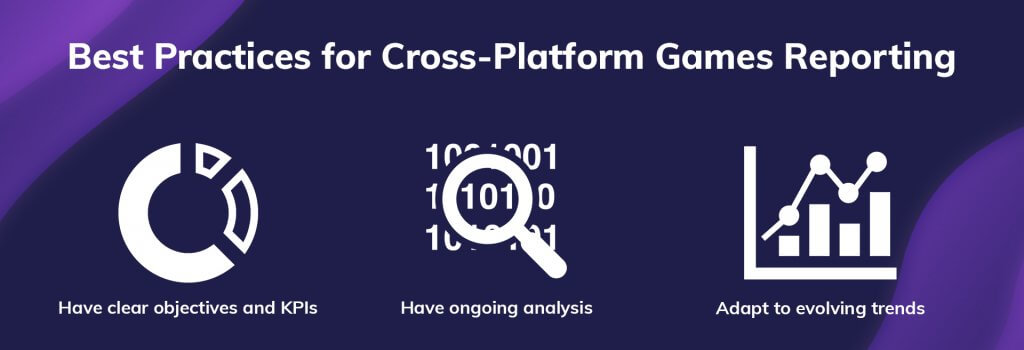
Establish clear objectives and KPIs
First and foremost, it is essential to establish clear reporting objectives and key performance indicators (KPIs). By defining specific goals and metrics to track, developers and publishers can focus their reporting efforts on the most relevant aspects of the game’s performance across platforms. Clear objectives and KPIs provide a framework for data analysis and help guide improvements and optimizations based on actionable insights.
Have ongoing analysis
Regular monitoring and analysis of data trends are crucial for effective cross-platform games reporting. By consistently reviewing gameplay data and identifying patterns and trends, developers can gain valuable insights into player behavior, preferences, and performance across different platforms.
This ongoing analysis enables timely adjustments and optimizations to enhance the gaming experience. Additionally, collaboration between developers, publishers, and analytics teams is vital. By fostering open communication and collaboration, all stakeholders can contribute their expertise and insights to the reporting process.
This collaborative approach ensures a comprehensive understanding of the data and facilitates effective decision-making based on shared insights and perspectives.
Adapt to evolving trends
It is also important to adapt reporting strategies to evolving industry trends. The gaming industry is dynamic and constantly evolving, with new platforms, technologies, and player expectations emerging.
To stay ahead, developers and publishers must adapt their reporting strategies to align with these changes. This includes keeping up with advancements in data tracking and analytics tools, as well as incorporating emerging industry trends, such as data privacy regulations, the integration of artificial intelligence in pipelines, and the use of machine learning in analytics.
By staying agile and responsive to industry shifts, developers and publishers can maintain a competitive edge and continuously improve their cross-platform games reporting practices.
Future trends in cross-platform games reporting
The future of cross-platform video games and reporting is poised for exciting advancements and innovations.
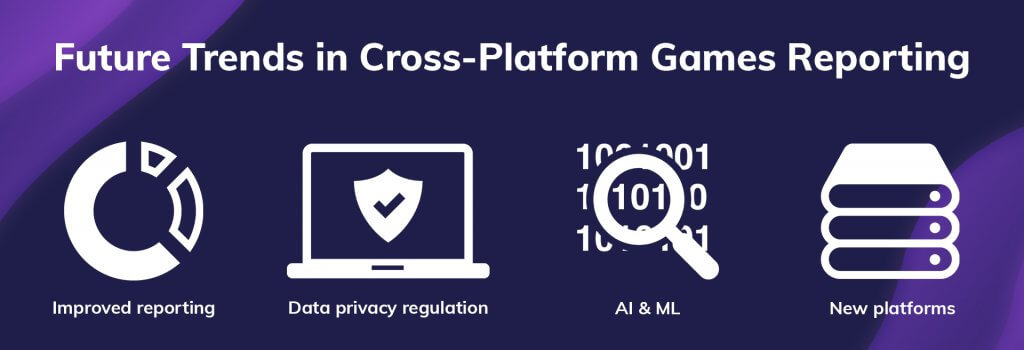
Improved reporting technology and methodologies
One notable trend is the continuous development of data tracking and reporting technologies. As technology evolves, game developers and publishers can expect more sophisticated tools and methodologies for collecting and analyzing gameplay data across multiple platforms.
These advancements will enable more accurate and comprehensive reporting, providing deeper insights into player behavior, preferences, and performance. From enhanced tracking mechanisms to more advanced analytics platforms, the future holds immense potential for cross-platform games reporting to deliver even more valuable and actionable insights.
Data privacy regulations and trends
Data privacy regulations and trends will also shape the future of cross-platform games reporting. As data privacy concerns continue to gain prominence, developers and publishers will need to ensure compliance with increasingly stringent regulations governing user data collection and sharing.
This will drive the development of privacy-centric reporting practices and technologies, such as improved data anonymization techniques and strengthened data security measures. Keeping player privacy at the forefront will be crucial for maintaining player trust and ensuring the longevity of cross-platform games reporting.
Artificial intelligence and machine learning
Additionally, the integration of artificial intelligence (AI) and machine learning (ML) in analytics is set to revolutionize cross-platform games reporting. AI and ML algorithms can process large volumes of data more efficiently, uncovering hidden patterns and generating insights that may not be immediately apparent to human analysts.
These technologies can assist in automating data analysis, identifying trends, and making predictions, enabling developers and publishers to make data-driven decisions in real-time. The integration of AI and ML in analytics will drive more accurate and personalized reporting, ultimately enhancing the overall gaming experience for players.
Emerging gaming platforms
Lastly, the emergence of new gaming platforms will have a significant impact on cross-platform games reporting. With the advent of technologies like cloud gaming, web3, and virtual reality, reporting practices will need to adapt to accommodate these platforms.
Developers and publishers will need to explore innovative ways of capturing and analyzing gameplay data from these emerging platforms, ensuring that cross-platform games reporting remains relevant and effective in this evolving landscape.
Key takeaways
As cross-platform gaming becomes more accessible and lucrative – and evolves to encompass a wider range of new platforms, trends, and technologies – game developers, publishers, marketers, and partners will need to continue to adapt.
This means having an agile team of experts who can pivot quickly and incorporate the latest trends, technologies, and data insights to drive increased revenue, player LTV, and ROAS.
If you need help leveling up your cross-platform game’s user acquisition, MASA can help!


